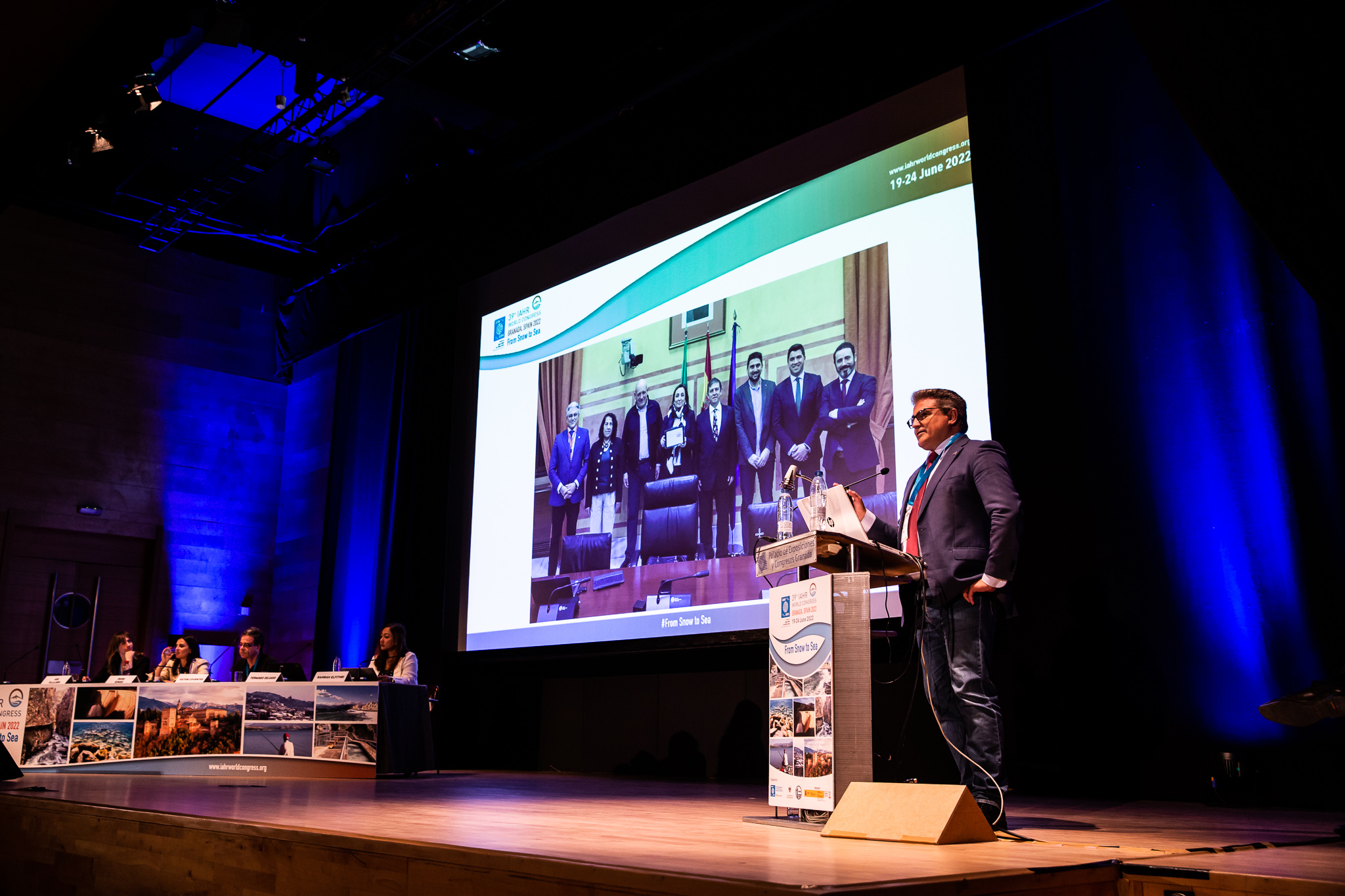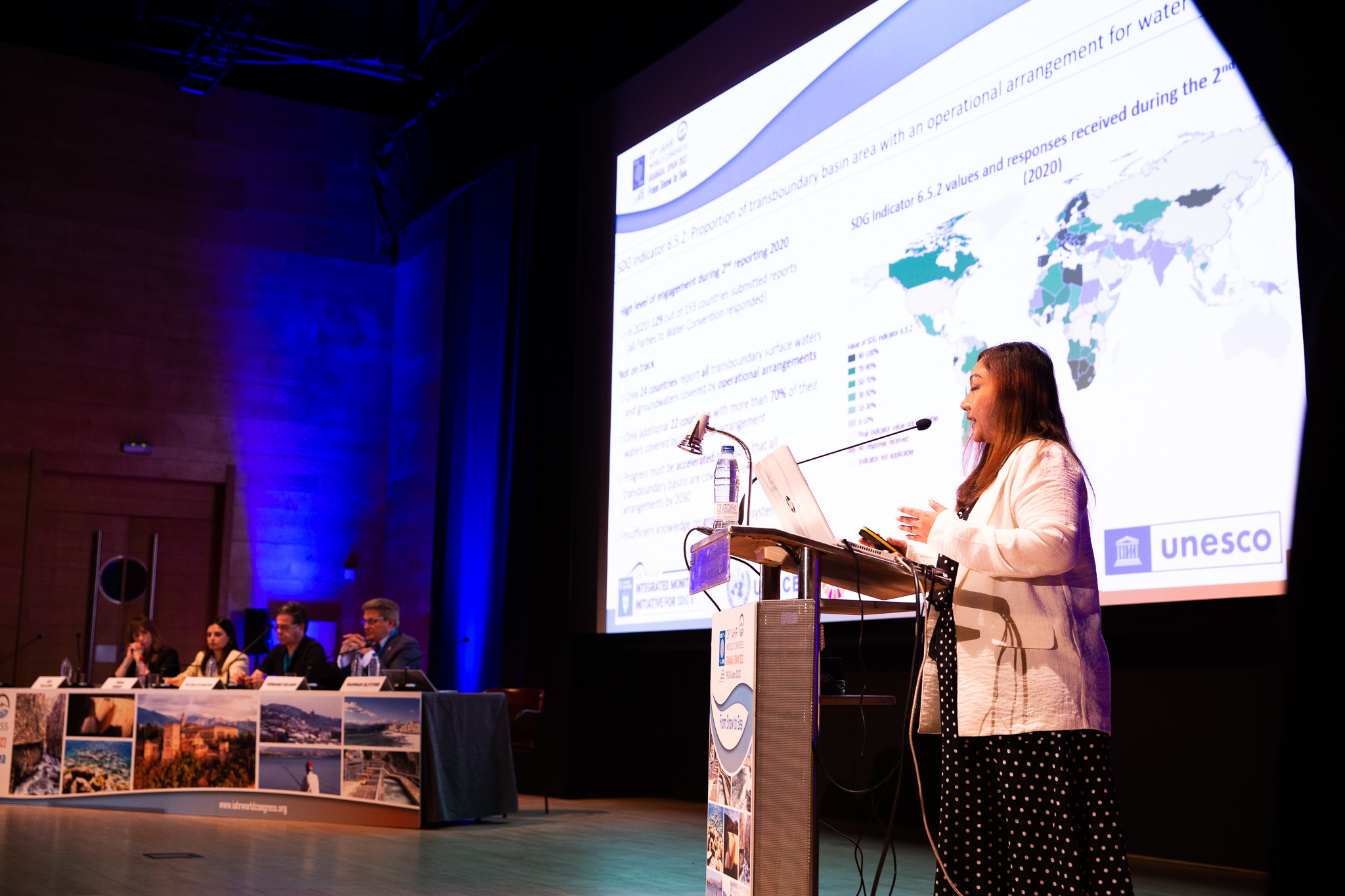High Level Panel: "Water Governance"
Date and time: Wednesday 22 June. 10:00 - 11:30 h.
Background
As the second High-Level Panel of the 39th IAHR World Congress, this session stressed how a sound Governance has became a crutial component in water planning, decision making and management.
Climate change is exarcervating a looming water crisis and is confronting us with challenges that require an improvement in the way in which the environmental policy is defined and implemented. Business as usual is not acceptable and new and better means are needed to improve decision making and to ensure that stakeholders and public can participate actively.
On a global scale, the need for a specific regulatory framework for water management, for strengthening institutional capacity, for greater public participation, or for developing a solid technical and scientific basis for decision-making has become evident. Ultimately, improving water governance has become imperative.
Purpose and scope of Panel

The main purpose of the panel was to answer the question of “How Governance can be the basis for facing water challenges?” taking into account that “best way” is a subjective issue that includes very different elements regarding social, environmental, economical, ethical and even cultural or artistic factors.
The High Level Panel contemplated different perspectives, associated with different geographical and administrative scales. Each of them linked to different needs. In fact, the improvement in governance must consider different levels of management and planning, ranging from the river basin, as the basis of natural phenomena, to national, regional, or multilateral territorial spheres, dependent on the specific socioeconomic frameworks through which the management of the river is carried out.
In consequence, the High Level Panel included participants who represent the competent authorities at a river basin district (the Guadalquivir Hydrographic Confederation), at a Region (Andalusian Autonomous Community), at national level (Moderator on behalf the Spanish Water Directorate of the Spanish Ministry for Ecological Transition and Demographic Challenge) and a multilateral institution (OECD). Additional experts on the panel highlighted the importance of having a system of water management that makes use of the best available technical and scientific knowledge (Academy and UNESCO) and described the specific needs in the urban water cycle (a representative of the Spanish Association for Water Supply and Sanitation
The Discussions
The format of the High Level Panel was an introduction from the moderator and short interventions of each one of the speakers followed by a discussion with questions as:
Which are the key principles for a sound water governance?
What should be the role of the different actors involved in water governance: governments at different level (local, regional, national), stakeholders, science, NGOs and public?
How we can improve the management and planning of international watersheds and aquifers?
Wow we can stress the crucial importance of science and knowledge in the decision process?
 Manuel Menéndez, Special Advisor in the Cabinet of the Spanish Deputy Minister of the Environment and Vice President of the Intergovernmental Hydrological Program of UNESCO (IHP), made an introduction to the definition of Governance and underlined the need of considering widely the context, not only taking into account social, environmental and economic factors, but ethical and even cultural or artistic factors as well.
Manuel Menéndez, Special Advisor in the Cabinet of the Spanish Deputy Minister of the Environment and Vice President of the Intergovernmental Hydrological Program of UNESCO (IHP), made an introduction to the definition of Governance and underlined the need of considering widely the context, not only taking into account social, environmental and economic factors, but ethical and even cultural or artistic factors as well.
Víctor Cifuentes, Head of Planning Unit in the Guadalquivir River Basin Competent Authority, described the main water issues to face with. According the Spanish Water Law, River Basin Districts are governed by different administrative bodies that ensure the fulfilment of the principle of water as public domain and the transparency and participatory approach to water management.
Fernando Delgado, Water Resources and Planning General Director in the Andalusian Regional Government, described the “Andalusian Pact for Water” involving all political parties, water authorities, stakeholders, academia and professional associations. The Pact proposes 10 strategic axes and 100 specific proposals in fields as Priority environmental objectives, Governance, Participation and transparency, Urban services and vital minimum, Structural deficits and sustainable demands, Mitigation and Adaptation to climate change or Cost Recovery.
Oriana Romano, Head of Unit, Water Governance and Circular Economy in the Cities, Urban Policies, and Sustainable Development Division of the OECD, stressed the essential role of a sound governance in the success of measures taken in water management. She exposed relevant examples, in different continents, of how measures can fail due to a lack of political, institutional, administrative or participatory good practices.
 Zhongbo Yu, Professor in Hohai University (China) and President of the UNESCO Intergovernmental Hydrological Programme sent a video with his presentation entitled “Adressing Challenge in Water Security: Water Science, Water Education, Water Governance”. Climate change is exacervating the uneven water distribution on Earth and increasing the magnitude and intensity of floods and droughts. The Intergubernamental Hydrological Programme of UNESCO has historically addressed this issues through Science and Capacity Building.
Zhongbo Yu, Professor in Hohai University (China) and President of the UNESCO Intergovernmental Hydrological Programme sent a video with his presentation entitled “Adressing Challenge in Water Security: Water Science, Water Education, Water Governance”. Climate change is exacervating the uneven water distribution on Earth and increasing the magnitude and intensity of floods and droughts. The Intergubernamental Hydrological Programme of UNESCO has historically addressed this issues through Science and Capacity Building.
Rahmah Elfithri, Chief of Section on Capacity Development and Water Family Coordination at the UNESCO Division of Water Sciences, described how the management of transboundary water bodies, specially aquifers, relies mainly on governance issues and how this issue is considered in the IX Phase of the Intergubernamental Hydrological Program (2022-2029).
Gari Villa-Landa, Head of International Affairs from the Spanish Association for Water Supply and Sanitation (AEAS) identified seven main challenges in the urban water cycle in Spain: Insufficient cost recovery, lack of investment, water tariffs, ageing infrastructure, Insufficient transparency, Further innovation (not just technological) and Regulatory and legislative diversity that are shared by many other countries. Measures for a sound governance include to ensure water services , Improve transparency and accountability, Improve efficiency of water services and increase the users protection.
Key messages
Sound water management cannot be achieved without robust governance that should be based on strong regulatory frameworks, improved institutional capacity, transparency and active public participation.
Improving governance needs a holistic approach that considers the hydrological cycle as a whole and that covers all levels of management and planning jurisdictions (river basin, international, national, regional, or multilateral territorial).
Governance should pave the way to facilitate the best available technical and scientific knowledge for decision making.